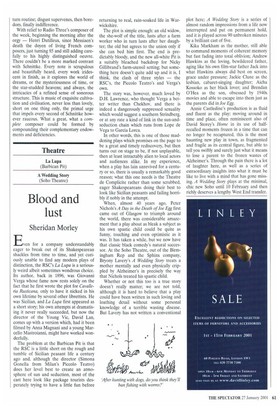La Lupa (Barbican Pit) A Wedding Story (Soho Theatre)
Blood and lust
Sheridan Morley
Eyen for a company understandably eager to break out of its Shakespearean shackles from time to time, and yet curiously unable to find any modern plays of distinction, the RSC's La Lupa is a seriously weird albeit sometimes wondrous choice. Its author, back in 1896, was Giovanni Verga whose fame now rests solely on the fact that he first wrote the plot for Cavalleria Rusticana, only to have it nicked in his own lifetime by several other librettists. He was Sicilian, and La Lupa first appeared as a short story; his own attempts at dramatising it never really succeeded, but now the director of the Young Vic, David Lan, comes up with a version which, had it been filmed by Anna Magnani and a young Marcello Mastroianni, might have worked wonderfully.
The problem at the Barbican Pit is that the RSC is a little short on the rough and tumble of Sicilian peasant life a century ago and, although the director (Simona Gonella from Milan's Piccolo Teatro) does her level best to create an atmosphere of sun and seduction, most of the cast here look like package tourists desperately trying to have a little fun before returning to real, rain-soaked life in Warwickshire.
The plot is simple enough: an old widow, the she-wolf of the title, lusts after a farm worker who in turn lusts after her daughter; the old bat agrees to the union only if she can bed him first The end is predictably bloody, and the new all-white Pit is a suitably bleached backdrop for Nicky Gillibrand's farm-utensil setting; but something here doesn't quite add up and it is, I think, the clash of three styles — the RSC's, the Piccolo Teatro's and Verga's own.
The story was, however, much loved by D.H. Lawrence, who thought Verga a better writer than Chekhov, and there is indeed a dangerously suppressed sexuality which would suggest a southern Strindberg, or at any rate a kind of link in the sun-andseduction chain which runs from Lope de Vega to Garcia Lorca.
In other words, this is one of those maddening plays which promises on the page to be a great and timely rediscovery, but then turns out on stage to be, if not unplayable, then at least intractably alien to local actors and audiences alike. In my experience, when a play has lain unrevived for a century or so, there is usually a remarkably good reason; what this one needs is the Theatre de Complicite rather than some scrubbed, eager Shakespeareans doing their best to look like Sicilian peasants and failing horribly if nobly in the attempt.
When, almost 40 years ago, Peter Nichols's A Day in the Death of Joe Egg first came out of Glasgow to triumph around the world, there was considerable amazement that a play about as bleak a subject as his own spastic child could be quite as funny, touching and even optimistic as it was. It has taken a while, but we now have that classic black comedy's natural successor. At the Soho Theatre, out of the Birmingham Rep and the Sphinx company, Bryony Lavery's A Wedding Story treats a mother mentally and even physically crippled by Alzheimer's in precisely the way that Nichols treated his spastic child.
Whether or not this too is a true story doesn't really matter; we are not told, although it is hard to believe that a play could have been written in such loving and loathing detail without some personal knowledge of a terrible wasting disease. But Lavery has not written a conventional plot here; A Wedding Story is a series of almost random impressions from a life now interrupted and put on permanent hold, and it is played across 90 unbroken minutes by a brilliant cast of five.
Kika Markham as the mother, still able to command moments of coherent memory but fast fading into total oblivion; Andrew Hawkins as the loving, bewildered father, aging like his own film-star father Jack into what Hawkins always did best on screen, grace under pressure; Jackie Clune as the lesbian, cabaret-singing daughter; Aicha Kossoko as her black lover; and Brendan O'Hea as the son, obsessed by 1940s movies and able to escape into them just as the parents did in Joe Egg.
Annie Castledine's production is as fluid and fluent as the play; moving around in time and place, often reminiscent also of David Storey's Home in its use of halfrecalled moments frozen in a time that can no longer be recaptured, this is the most haunting new play in town, as fragmented and fragile as its central figure, but able to tell you swiftly and surely just what it means to lose a parent to the frozen wastes of Alzheimer's. Through the pain there is a lot of laughter here, as well as a series of extraordinary insights into what it must be like to live with a mind that has gone missing. A Wedding Story plays at the minimal, chic new Soho until 10 February and then richly deserves a lengthy West End transfer.






















































































 Previous page
Previous page